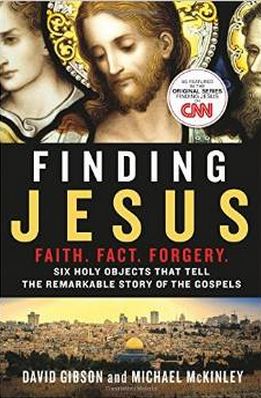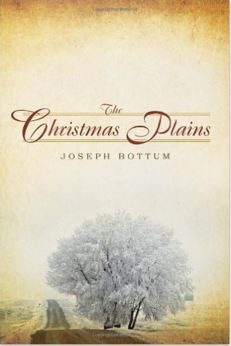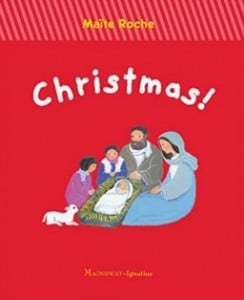 If it’s Lent, it must be time for yet another series that questions the veracity of faith. This year’s offering is a new six-part series by CNN, Finding Jesus: Faith, Fact, Forgery, which begins on Sunday, March 1 at 9 p.m. ET/PT and concludes on Easter Sunday. Finding Jesus is co-written by award-winning journalists, authors and filmmakers David Gibson and Michael McKinley, who also co-authored the companion book.
If it’s Lent, it must be time for yet another series that questions the veracity of faith. This year’s offering is a new six-part series by CNN, Finding Jesus: Faith, Fact, Forgery, which begins on Sunday, March 1 at 9 p.m. ET/PT and concludes on Easter Sunday. Finding Jesus is co-written by award-winning journalists, authors and filmmakers David Gibson and Michael McKinley, who also co-authored the companion book.
Finding Jesus looks at six holy objects from the time of Christ, offering scientific evidence and academic research concerning the Shroud of Turin, the Sudarium of Oviedo and the True Cross. The series also addresses controversial finds including the Gnostic gospel of Mary Magdalene (which was popularized in Dan Brown’s fictional novel The DaVinci Code) and the James Ossuary, both of which seem to contradict historic Christian teachings.
* * * * *
As a Christian, I might be expected to run in the opposite direction when the first episode comes on this Sunday.
But no: It’s elegantly filmed in the Holy Land, offering fascinating new insights into the realm of scientific techniques and archaeological research. Commentary is provided by a panel of on-screen contributors: academics from Yale, Harvard, Princeton and Oxford, and including Catholics Father James Martin SJ, editor of America, and Dr. Candida Moss, professor of New Testament and Early Christianity at Notre Dame University.
A faith that is tempered in the fire of doubt will stand strong. Finding Jesus asks hard questions, then seeks to answer them through science and the historical record. Sometimes they get it right: They recognize that Mary Magdalene was not the wife of Jesus. They encourage reading of the Gnostic gospel of Judas not as a literal narrative, but as an early marker in a long literary tradition.
Sometimes, though, the filmmakers seem to attach too much importance to these objects.
That was certainly the case for the Shroud of Turin, the subject of Sunday’s episode, which I’ve already screened. At one point, the companion book describes the Shroud as “a stunning, unique image that would be not only the sole physical evidence that Christ existed (emphasis mine) but also the only image of the true face of the Son of God.” The television documentary seems to imply that without the Shroud, we’d not be certain of the existence of Christ–which is a particularly serious problem, because the writers seem to conclude that it’s a forgery. Their report encompasses research which carbon dates the Shroud to the Middle Ages, but fails to include later studies which countered the earlier carbon dating and which again proved it to be a historical remnant dating to the time of Christ. If the Shroud matters that much, if it’s the only relevant evidence of the historicity of the Gospels, then should we perhaps doubt the faith which has guided us to this point?
To which I say, no! More important, much more important is the account of the four Gospels and the constant teaching of the Church. The Shroud of Turin may be a great gift to the believer; but even if there was no knowledge of the Shroud’s existence, still there would be the Church, leading the people of faith to greater love and greater knowledge of God.
Also worth emphasizing is that like modern-day apparitions, the Shroud may buttress the faith of the believer; but it is not necessary for faith. The evidence of the Shroud–like private revelations (even those, such as Fatima and Lourdes, which have received the Church’s formal approval)–remains an object for personal discernment and need not be accepted in order for one to achieve salvation.
* * * * *
Sister Simone Campbell, the quintessential nun on the bus, endorsed Finding Jesus and wrote that “holy doubt” is an essential element of faith. I disagree. I see doubt more as a fallen log across the path, a distraction which must be overcome in order to continue on our journey toward God. Doubt is a challenge which we can conquer, to be sure; but it wastes our time, time which could be better spent in dogged pursuit of the Truth that is God.
* * * * *
So should you watch Finding Jesus on Sunday night? I vote an enthusiastic “Yes.”
First, it’s important to understand the claims which the film makes, thus preparing yourself to intelligently counter misconceptions in the cafeteria or the checkout lane by explaining the logic of the Catholic perspective.
But more than that, there is much artistic beauty and relevant information wrapped up in this well-crafted documentary. If director David Gibson’s insights occasionally differ from mine, that doesn’t diminish the series’ compelling message. Christians who want to be informed will enjoy CNN’s six-part series Finding Jesus on Lenten Sundays.















